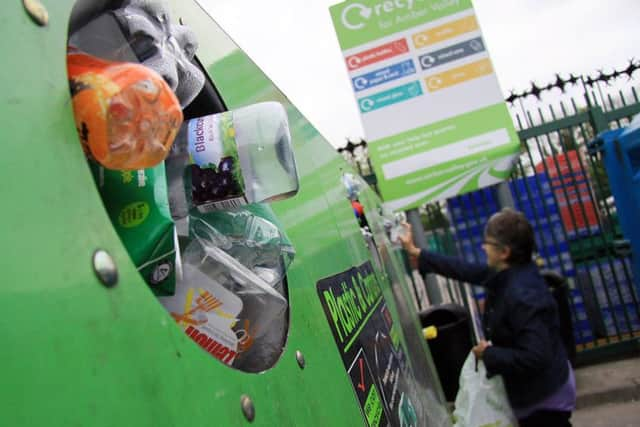Nottinghamshire is below the recycling target for 2020
and live on Freeview channel 276
In 2016-2017, the council recycled or composted 186,793 tonnes of all waste, about 44.2 per cent of the overall collected.
These figures are better than two years ago, when 43.1 per cent of the rubbish was recycled.
Advertisement
Hide AdAdvertisement
Hide AdThe data includes the rubbish made up of everyday items that are disposed of by the public at home or on the go.


England recycled on average 42.7 per cent of the waste produced over the last year.
Incineration plants burnt 44 per cent of the rubbish produced in the council. The vast majority of it was sent to specialist Energy-from-Waste (EfW) power plants as fuel to generate heat and electricity.
Nottinghamshire sent 36,913 tonnes of waste to landfills in 2016-2017 - about nine per cent of the total.
Advertisement
Hide AdAdvertisement
Hide AdThe Government aims to cut to 35 per cent the proportion of rubbish going to landfill by 2020.
These targets are part of a new strategy drawn up by the European Union and backed by Theresa May’s cabinet in April.
A report launched last week in the House of Lords stoked the debate on burning waste in Britain.
Labour, Conservative and Liberal Democrat politicians warned about the negative impact on health of the “incinerator boom” and called on the Government to take oversight on the industry and introduce an incineration tax.
Advertisement
Hide AdAdvertisement
Hide AdShlomo Dowen, national coordinator of United Kingdom Without Incineration Network (UKWIN), reckons that many materials which could be recycled are being incinerated.
He said: “Unfortunately councils are reacting too slowly to the growing public demand for more recycling and less incineration.
“The introduction of an incineration tax would send a clear message to councils and businesses that incineration is not the way forward.
“Money raised through an incineration tax can be spent on better local recycling and re-use schemes.
Advertisement
Hide AdAdvertisement
Hide Ad“Across the UK there is more than 19 million tonnes of residual waste treatment capacity operational or under construction, but forecasts indicate that by 2030 there will only be around 10 million tonnes of residual waste available for treatment.
“This means that we are already facing an overcapacity of incineration that is harming recycling.
“The real choice is not between incineration and landfill, but between incineration and recycling”.
Baroness Jones, the Green Party member of the House of Lords, said: “We need to build more of our own infrastructure in order to recycle and deal with our own waste.
Advertisement
Hide AdAdvertisement
Hide Ad“The ban on recycled waste going to China has inevitably lead to a UK pile up and that could bring forward the moment when our recycling gets treated as a fuel, rather than a valuable resource.
“Post Brexit we need to come up with new rules that ensure that a certain proportion of material in key products includes recycled materials. This would create a market for the recycled goods and encourage industry to invest.”